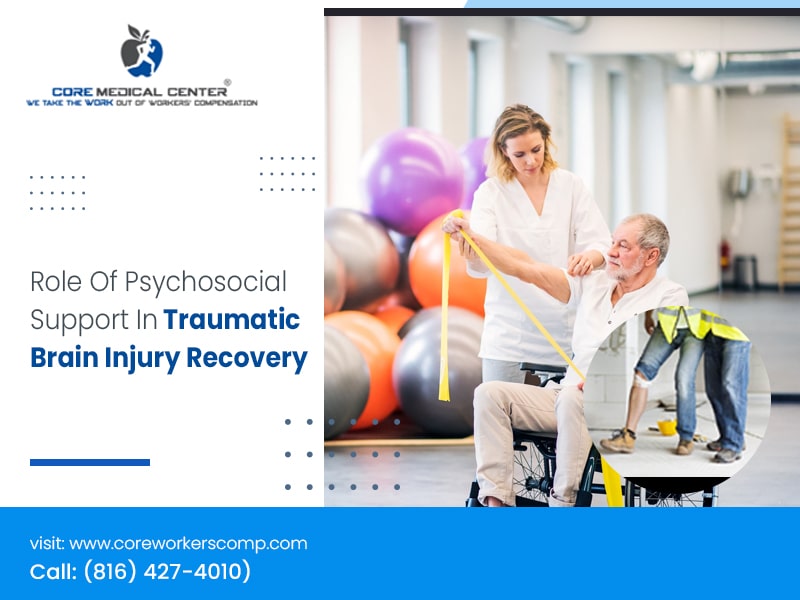Surviving a traumatic brain injury (TBI) represents only the initial hurdle. Recovering mind, body, and spirit functioning for maximal independence post-injury poses equal challenges. This complex healing process makes incorporating Psychosocial Support systems essential when rebuilding life after TBI trauma. If you are looking for the best Traumatic Brain Injury Rehabilitation program or Psychosocial Support for your brain injuries, reach out to Core Medical Center, USA, today.
We are a premier medical facility specializing in worker’s compensation and work-related injuries in the USA. Our comprehensive program will maximize your physical and psychological recovery after a traumatic brain injury. Contact us online or call our Blue Springs, Missouri, offices today to learn more. This blog will discuss the role of Psychosocial Support in TBI recovery.
Let’s dive in:-
- Defining TBI
- Broad Effects
- Psychosocial Challenges
- Essential Psychosocial Support Elements
- Setting Recovery Goals
- Addressing Cognitive Remediation
- Promoting Gradual Community Reintegration
- Providing Ongoing Support
- Emphasizing Empowerment
Defining TBI:
TBI encompasses any sudden external impacts injuring the brain – from sports collisions and violence to falls and vehicle accidents. Brain damage might appear relatively mild, like brief unconsciousness or amnesia. However, even concussions cause lasting neurocognitive, emotional, and functional damage, hampering life participation.
Broad Effects:
TBI ignition sites damage brain matter at points of contact. But shockwaves frequently generate extensive lesions throughout the brain, interrupting connections and facilitating mobility, senses, cognition, and reasoning. These disruptions inevitability affect psychological health and engagement in customary roles.
Psychosocial Challenges:
Common TBI psychosocial consequences include:-
- Personality changes like disinhibition, aggression, or apathy
- Depression, anxiety, and emotional volatility
- Difficulty regulating behaviors and impulse control
- Reduced communication capacities, including expressive speech
- Struggles managing everyday home, financial, and work obligations
- Strained interpersonal relationships from an emotional distance or neediness
- Social isolation and loneliness
- Identity confusion and lowered self-esteem
These issues complicate all other recovery efforts.
Essential Psychosocial Support Elements:
Psychosocial Support or rehabilitation delivered by specialized teams helps buffer TBI patients against these negative mind and life impacts during the early stages and beyond. Support components include:
- Counseling addressing coping, adjustment issues, and building resilience
- Behavior modification plans to teach emotional and impulse regulation
- Communication coaching on social appropriateness and listening strategies
- Assistance in organizing, planning, and establishing structured routines
- Family education programs on adapting dynamics and providing empowering assistance
- Peer mentoring and support groups to reduce isolation
Combining these interventions aims to restore confidence and maximum feasible functioning post-TBI. They represent pivotal cogs in the recovery process.
Setting Recovery Goals:
Psychological Support practitioners help patients set incremental goals across three phases: early recovery stabilization, mid-term improvement, and longer-term maintenance. It empowers patients with a sense of direction amidst profound life changes.
Addressing Cognitive Remediation:
Restorative cognitive therapies retrain damaged neural pathways controlling concentration, memory, reasoning, and executive functions. As cognition indirectly affects emotional health, boosting mental stamina aids psychosocial progress.
Promoting Gradual Community Reintegration:
As capacities improve, psychosocial teams deliberately assist in increasing community participation and independence. It might mean joining a book club, volunteering, or returning to work in adapted roles. Social re-engagement enhances confidence and life quality.
Providing Ongoing Support:
Recovery is a lifelong process, with psychosocial needs changing over time. Relapse coping strategies, vocational mentoring, marital counselling, or medication management may be necessary during different stages. Offering an open door for support prevents setbacks.
Emphasizing Empowerment:
Central to the psychosocial approach is empowering survivors to make health decisions whenever possible. It means providing education, skill-building opportunities, and respecting patients’ choices to reclaim dignity and personal control.
Final Thoughts
While physical TBI healing remains paramount, dedicating equal attention to psychosocial healing and skills redevelopment is indispensable for reclaiming satisfying lifestyles. With sustained support, those impacted can still thrive despite trauma. If you seek proper Traumatic Brain Injury Rehabilitation and Psychosocial Support, reach out to Core Medical Center, USA, today.

